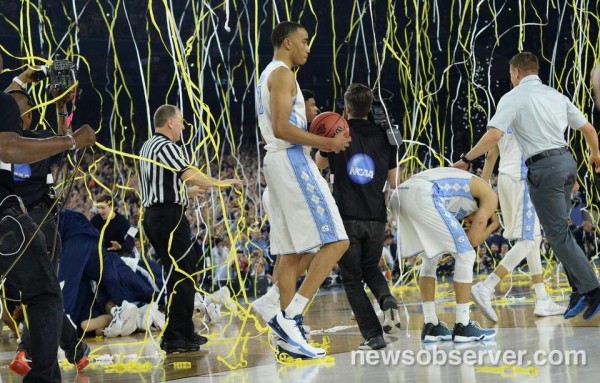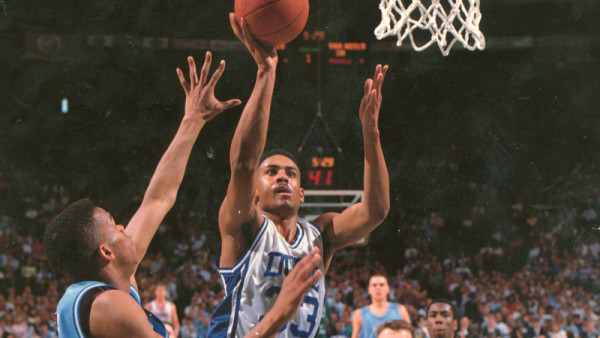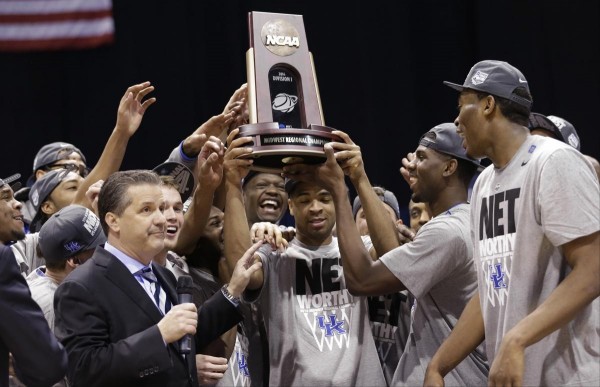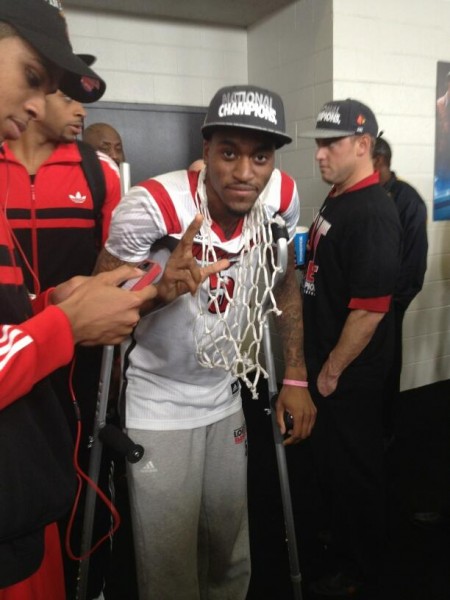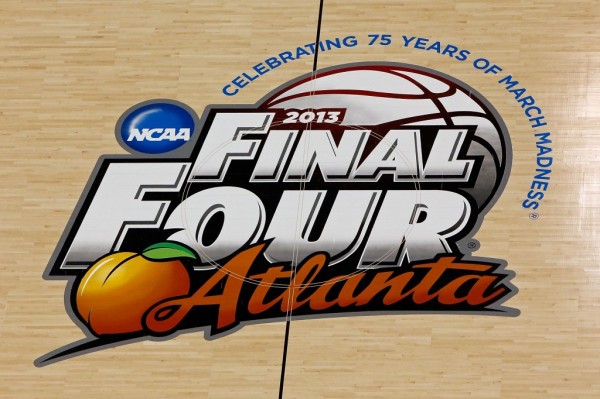Posted by rtmsf on April 8th, 2008
So we’ve had some time to ruminate on last night’s proceedings in San Antonio, and we keep circling back to the same conclusion. This was a great college basketball game, but it wasn’t a classically great game in the sense that both teams played exceptionally well and the better team won at the end (think the punch-counterpunch of 92 Duke-Kentucky). No, this game represented for us the maxim of: the team that chokes least is the team that wins. This is to take nothing away from Kansas, who made nearly every play (but one on the missed FT rebound that Memphis stole) in the final two minutes to give themselves a sliver of a chance to win, and once they had that chance in OT, they put the game away like champions do.
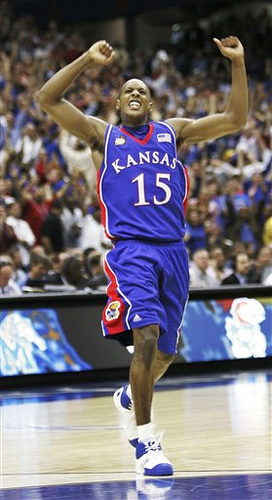
Chalmers the Hero (AP Photo/Eric Gay)
No, we’re referring to the 6-7 minutes prior to those final two, when Kansas was still leading the game by three at the 9-minute mark and Bill Self inexplicably decided to go box-and-one on Chris Douglas-Roberts despite the fact that CDR only had two points in the second half. By the same token, Derrick Rose also had only two points in the second half and was struggling to find openings in the KU defense. We all know what came next. The box-and-one opened up driving lanes and shooting spots for Derrick Rose, who then proceeded to score 12 of the next 14 Memphis points as he found the groove facilitated by the switch in Kansas defense. The next thing you know there were less than three minutes remaining and KU was down nine, looked as tight as a drum and had turned the ball over seemingly every trip down the floor. This was Memphis’ game to lose. Check our liveblog for our feelings at this point in the game – we said, “2:22 – Rose’s ridiculous shot was only a two, but somehow we knew that it was going in when he shot it. Wow, Rush babied that one when he should have dunked it. This team is TIGHT right now. We’re not sure they have enough left to make one more run.”
And with under two minutes, things changed for Kansas. Darrell Arthur threw in an 18-footer that he normally wouldn’t take or make, and then the key play of the comeback occurred – Kansas stole the ball off the inbounds and instead of driving in and taking a contested layup attempt, they kicked it out to Sherron Collins for a dagger three. Those two plays were the most offense KU had enjoyed in the last eight minutes of the game. And suddenly, KU was only down four and it seemed as if their confidence was back.
But the Memphis choke hadn’t begun yet. Both teams traded FTs, and then with 1:15 remaining CDR (71%) missed the first of three consecutive foul shots. All badly. Kansas’ Sherron Collins made a terrible decision to go 1-on-3 against the Memphis bigs after one of those misses, but it didn’t matter because CDR couldn’t convert on the line anyway. The one that really surprised us the most was Derrick Rose missing the first of two FTs with only ten seconds left. For a moment we were thinking this could be Darius Washington, Jr., time again, but he did convert the second and KU came screaming upcourt.
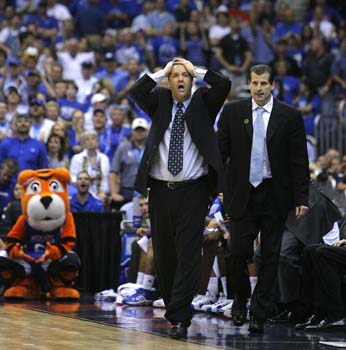
Calipari Sees It Slipping Away (RICH SUGG/Kansas City Star)
Bilas, Digger and Vitale were going on and on about how Calipari should have called timeout after the Rose FT and given his troops some direction as to whether to foul (Memphis had two TOs left). In the postgame comments, Calipari made a dubious claim (see 0:21 to 0:34) that they tried to foul Sherron Collins when he was falling down out of control, but replays show clearly that the Memphis defenders were trying very hard to keep from fouling there. We tend to agree that the coaches should foul in those situations, but it’s more fun for the viewing public when they don’t. At any rate, it’s obvious that Calipari and his team were shellshocked by being two minutes from a national championship and really had no clue as to what they should be doing at that point. When Chalmers shot dropped to tie the game (and Dozier’s 50 footer missed), we would have given whatever odds you wanted on Memphis at that point. There was no way they were coming back from that collapse. Actually, in recent history the collapse reminds us a little of the UNC-Georgetown regional final game in last year’s tournament. There was simply no way that UNC was coming back in the OT after gacking up that lead in the final few minutes.
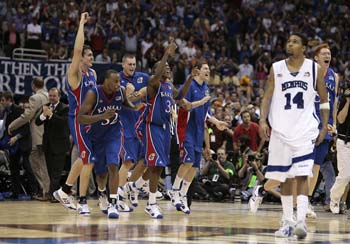
KU – 2008 National Champions (SHANE KEYSER/Kansas City Star)
So it was a great championship game, probably the best since that 1997 OT game between Arizona and Kentucky (which also featured some choking by UK’s Nazr Mohammed at the foul line). And Mario Chalmers deserves all the accolades he shall receive for stepping into that pressure-filled three pointer like a champion and knocking it down. Congrats to the Jayhawks.
Now about that Bill Self to Oklahoma St. thing…
| 2008 ncaa tournament
| Tagged: bill self, chris douglas-roberts, darius washington jr, darrell arthur, derrick rose, john calipari, kansas, mario chalmers, memphis, national championship game, oklahoma st, robert dozier, sherron collins
Share this story





























